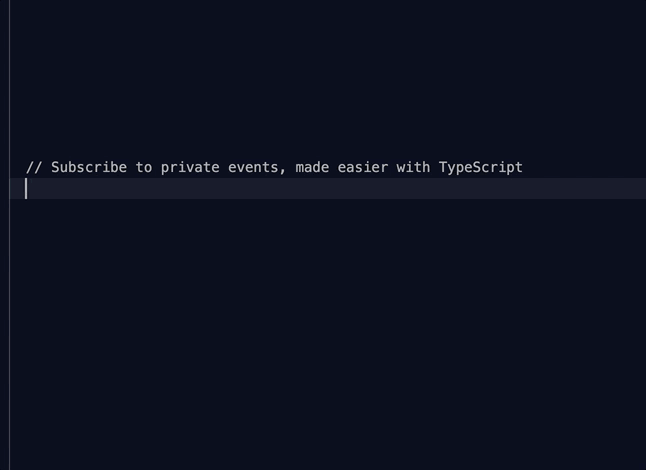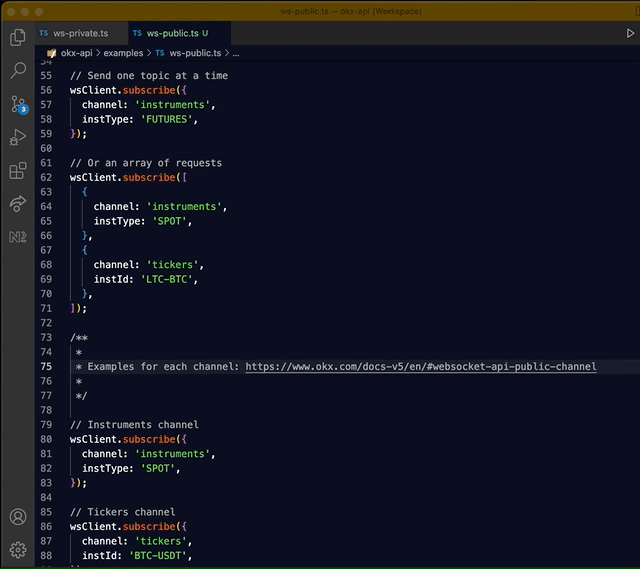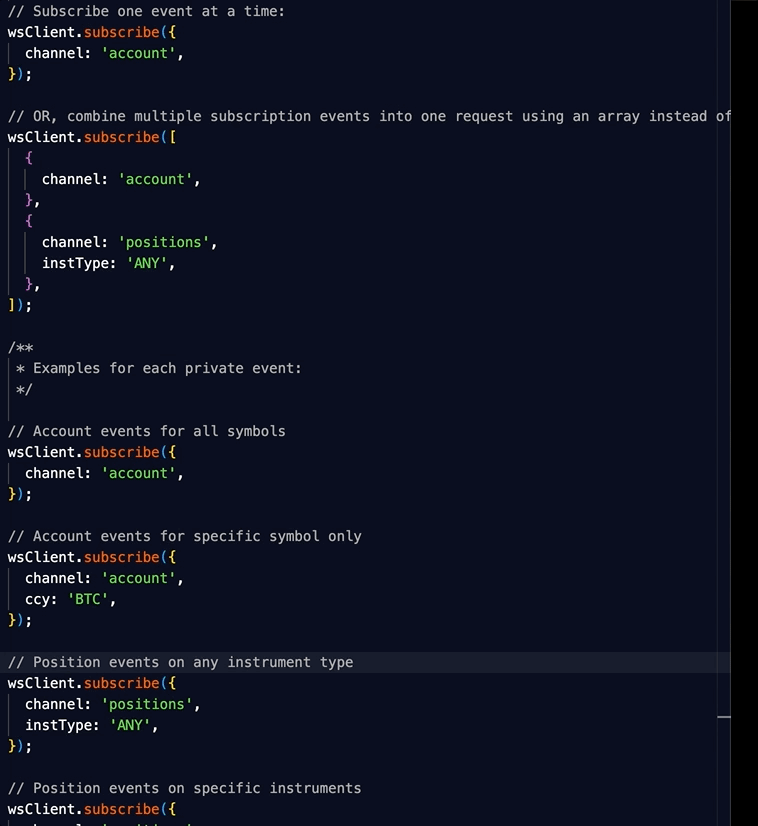Complete, updated & performant Node.js SDK for the OKX(OKEX) APIs and WebSockets:
- Complete integration with all OKX APIs, including the v5 APIs.
- TypeScript support (with type declarations for most API requests & responses).
- Over 100 end-to-end tests making real API calls & WebSocket connections, validating any changes before they reach npm.
- Robust WebSocket integration
- Configurable connection heartbeats (automatically detect failing connections).
- Automatic reconnect then resubscribe workflows.
- Automatic authentication and heartbeat handling.
- Browser support (via webpack bundle - see "Browser Usage" below).
npm install okx-api- Issues? Check the issues tab.
- Discuss & collaborate with other node devs? Join our Node.js Algo Traders engineering community on telegram.
- Follow our announcement channel for real-time updates on X/Twitter
Check out my related JavaScript/TypeScript/Node.js projects:
- Try my REST API & WebSocket SDKs:
- Try my misc utilities:
- Check out my examples:
Most methods accept JS objects. These can be populated using parameters specified by okx's API documentation, or check the type definition in the rest-client class methods.
- RestClient
- OKX API Documentation
- REST Endpoint Function List
- TSDoc Documentation (generated using typedoc via npm module)
Support my efforts to make algo trading accessible to all - register with my referral links:
For more ways to give thanks & support my efforts, visit Contributions & Thanks!
This project uses typescript. Resources are stored in 3 key structures:
- src - the whole connector written in typescript
- lib - the javascript version of the project (compiled from typescript). This should not be edited directly, as it will be overwritten with each release. This is also the version published to npm.
- dist - the packed bundle of the project for use in browser environments (manual, using webpack).
- examples - some implementation examples & demonstrations. Contributions are welcome!
Create API credentials at okx
- If your IDE doesn't have IntelliSense, check the rest-client.ts for a list of methods, params & return types.
- Requests follow the same ordering and format as the categories in the API docs.
- Responses are parsed automatically for less nesting. Error responses are thrown in full:
- If the response looks successful (HTTP 200 and "code" in the response body === "0"), only the
dataproperty is directly (without thecode,data&msgproperties). - If the response looks like an error (HTTP error OR the "code" property in the response does not equal "0"), the full response is thrown (including
codeandmsgproperties). See the interface for APIResponse.
- If the response looks successful (HTTP 200 and "code" in the response body === "0"), only the
import { RestClient } from 'okx-api';
const client = new RestClient({
apiKey: 'apiKeyHere',
apiSecret: 'apiSecretHere',
apiPass: 'apiPassHere',
});
// Submit a buy and sell market order
(async () => {
try {
const allBalances = await client.getBalance();
console.log('All balances: ', allBalances);
const buyResult = await client.submitOrder({
instId: 'BTC-USDT',
ordType: 'market',
side: 'buy',
sz: '0.1',
tdMode: 'cash',
tgtCcy: 'base_ccy',
});
console.log('buy order result: ', buyResult);
const sellResult = await client.submitOrder({
instId: 'BTC-USDT',
ordType: 'market',
side: 'sell',
sz: '0.1',
tdMode: 'cash',
tgtCcy: 'base_ccy',
});
console.log('Sell order result: ', sellResult);
} catch (e) {
console.error('request failed: ', e);
}
})();This connector includes a high-performance node.js & typescript websocket client for the OKX public & private websockets.
- If your IDE doesn't have IntelliSense, check the websocket-client.ts for a list of methods, params & return types.
- When subscribing to channels, only the "args" should be passed as an object or array when calling the websocket client subcribe() function: API docs.
- TypeScript recommended (but it is not required) for a richer experience:

- The ws client will automatically open connections as needed when subscribing to a channel.
- If the connection is lost for any reason, the ws client will detect this (via the connection heartbeats). It will then:
- Automatically teardown the dead connection.
- Automatically respawn a fresh connection.
- Automatically reauthenticate, if using private channels.
- Automatically resubscribe to previously subscribed topics.
- Resume producing events as before, without extra handling needed in your logic.
- The ws client will automatically authenticate if accounts are provided and a private channel is subscribed to.
- Up to 100 accounts are supported on the private connection, as per the API docs. Authentication is automatic if accounts are provided.
- For examples in using the websocket client, check the examples in the repo:
- Private channels (account data): examples/ws-private.ts
- Public chanels (market data): examples/ws-public.ts
- These examples are written in TypeScript, so can be executed with ts-node for easy testing:
ts-node examples/ws-private.ts - Or convert them to javascript:
- Change the
import { ... } from 'okx-api'toconst { ... } = require('okx-api'); - Rename the file to
ws-private.js - And execute with node:
node examples/ws-private.js
- Change the
See examples/ws-public.ts for a full example:
See examples/ws-private.ts for a full example:
This is the "modern" way, allowing the package to be directly imported into frontend projects with full typescript support.
- Install these dependencies
npm install crypto-browserify stream-browserify
- Add this to your
tsconfig.json{ "compilerOptions": { "paths": { "crypto": [ "./node_modules/crypto-browserify" ], "stream": [ "./node_modules/stream-browserify" ] } - Declare this in the global context of your application (ex: in polyfills for angular)
(window as any).global = window;
This is the "old" way of using this package on webpages. This will build a minified js bundle that can be pulled in using a script tag on a website.
Build a bundle using webpack:
npm installnpm buildnpm pack
The bundle can be found in dist/. Altough usage should be largely consistent, smaller differences will exist. Documentation is still TODO.
This SDK includes a bundled llms.txt file in the root of the repository. If you're developing with LLMs, use the included llms.txt with your LLM - it will significantly improve the LLMs understanding of how to correctly use this SDK.
This file contains AI optimised structure of all the functions in this package, and their parameters for easier use with any learning models or artificial intelligence.
Have my projects helped you? Share the love, there are many ways you can show your thanks:
- Star & share my projects.
- Are my projects useful? Sponsor me on Github and support my effort to maintain & improve them: https://github.com/sponsors/tiagosiebler
- Have an interesting project? Get in touch & invite me to it.
- Or buy me all the coffee:
- ETH(ERC20):
0xA3Bda8BecaB4DCdA539Dc16F9C54a592553Be06C
- ETH(ERC20):
Contributions are encouraged, I will review any incoming pull requests. See the issues tab for todo items.







